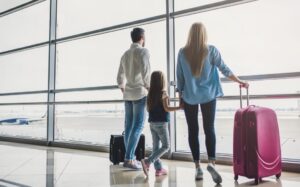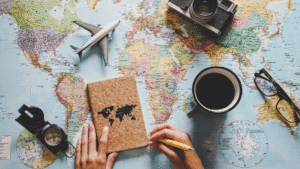According to recent research, women make up nearly 85% of solo travelers, and the number of women traveling alone has never been higher. This striking shift reflects a shift in people’s desire for independence, self-discovery, and exploring the world on their own terms. The flexibility to choose where you travel, how fast you travel, and how deeply you immerse yourself in a new culture without compromise can lead to life-changing experiences and build confidence and resilience. However, to travel safely and confidently as a solo woman, you must plan, be vigilant, and plan wisely.
Pre-Trip Planning:
Every successful solo adventure for women begins with careful planning. Do your research, including local customs, cultural norms, and current safety measures. Knowing dress codes, expected reactions, and appropriate behavior will help you blend in and avoid standing out. Choose accommodations with good reviews, a central location, good lighting, and convenient public transportation. Book your first few nights in advance so you don’t have to worry about finding safe accommodations upon arrival.
Make multiple copies of important documents, such as your passport, ID, travel insurance, and emergency contacts. Store electronic documents in the cloud and leave paper copies with trusted individuals at home. When traveling abroad, register with your embassy or consulate and give copies of your complete itinerary to family or friends. Purchase comprehensive travel insurance that covers medical emergencies, trip cancellations, and lost or stolen items.
Travel Safety:
When traveling alone, it’s important to stay alert and confident. If something feels off, trust your instincts and don’t be afraid to flee a potentially dangerous situation. Avoid displaying expensive jewelry, electronic devices, or large amounts of cash to avoid attracting unwanted attention. Store valuables in your hotel safe and only take essentials with you.
Your travel habits significantly impact your safety and travel experience. Before arriving at your destination, research available taxi services, ride-sharing apps, or public transportation. If traveling by bus or train at night, sit close to the driver and get off at well-lit stops. Walking is still a great way to explore new places, but it’s best to stay in busy areas during the day and avoid empty roads at night.
Communication is a crucial tool for your safety. Learn a few basic phrases in the local language, especially those related to emergencies or seeking help. Bring a working mobile phone with local emergency numbers and consider purchasing a local SIM card or international roaming plan. Download translation and offline map apps to stay connected even when you’re offline.
Embrace the Experience:
Traveling alone is the best way to grow personally and gain authentic experiences. You can fully indulge in activities you truly enjoy without having to compromise or consider the needs of others. You can visit museums, take cooking classes, explore local markets, or simply relax in a café and enjoy the life around you.
Flexibility is your best asset when traveling solo. Seize unexpected opportunities while adhering to basic safety rules. If you meet other travelers who also want to explore, consider joining them on day trips or activities. But maintain your freedom and don’t feel pressured to constantly do things that are counterproductive or uncomfortable.
Take photos, keep a journal or blog to document your journey, and reflect on what you’ve learned. Solo travel often offers the opportunity for deep reflection and personal insights worth cherishing. These notes will help you remember your courage and skills long after you return home.
Meet the Locals:
True cultural connections enhance any solo trip and provide added security through local knowledge. Participate in planned activities, visit cultural centers, or attend community events to meet others in a safe and organized environment. Markets, festivals, and religious sites are great places for respectful cultural exchange.
Consider staying in local hotels, dining at family-run restaurants, or participating in homestay programs; these programs help you connect with locals and support the local economy. These experiences often offer insider information on hidden gems, safety concerns, and cultural nuances that travel guides can’t cover.
Language barriers don’t have to stop you from connecting with locals. People often respond positively to simple gestures, smiles, and attempts to speak the local language. Bring translation software or a phrasebook to aid in basic interactions. Also, remember that asking questions and showing respect transcend language barriers.
Extend Your Solo Adventure:
As a woman, solo travel is more than just a temporary escape from the daily grind; it fosters lasting self-confidence, cultural awareness, and personal strength. Every successful trip strengthens your ability to solve problems independently and broadens your perspective on new ideas and opportunities. The skills you learn during solo travel—like problem-solving, adapting to a new culture, and trusting yourself—will benefit you in all aspects of your life long after you return home. Your adventures will inspire other women to embark on their own journeys, starting a cycle of discovery and empowerment. Plan your next solo trip now, knowing that every step you take will make your future travels more exciting and fulfilling.
FAQs:
1. Where are the safest places for a woman traveling solo for the first time?
Iceland, New Zealand, Japan, Canada, and Singapore all have low crime rates, developed tourism infrastructure, and cultures welcoming to solo women travelers. These countries offer excellent public transportation, English-speaking residents, and established support systems for travelers from other countries.
2. How much should I budget for solo travel as a woman?
Your travel budget largely depends on your destination, travel style, and length of stay. Generally, you should spend 20% to 30% more than your group travel budget on individual extras, private transportation, and safety-related expenses, such as premium hotels or a guide (if needed).
3. Should I tell others I’m traveling alone?
Be cautious about discussing your single status. Communicating openly with other travelers can help you make friends, but avoid telling strangers or potentially dangerous people that you’re traveling alone. Find a balance between openness and privacy, depending on your comfort level and understanding of the situation.
4. How can you meet other travelers without worrying?
Go to planned events, stay in social settings like hostels with shared spaces, or use reputable travel apps to meet other travelers. Make sure you meet new people in public places and trust your instincts to get to know the person and the situation before agreeing to stay with them.
5. What can I do if I feel lonely while traveling alone?
Solo travelers sometimes experience loneliness, which is a typical part of their experience. You can combat loneliness by living in social housing, participating in group activities, video chatting with friends and family, or simply chatting with people you meet while shopping or dining out.




